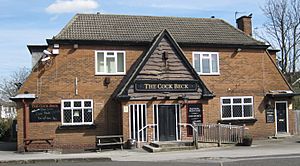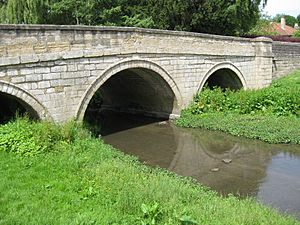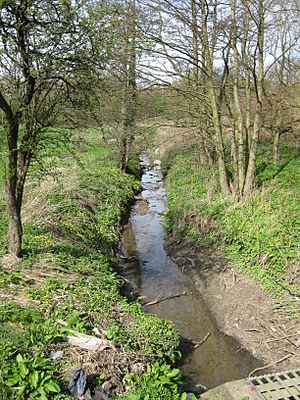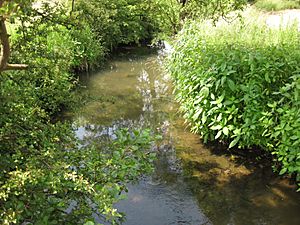Cock Beck facts for kids
The Cock Beck is a small stream in the eastern parts of Leeds, West Yorkshire, England. It starts from water running off the land north-west of Whinmoor. The beck then flows past several places like Swarcliffe, Manston, Scholes, Barwick-in-Elmet, Aberford, Towton, and Stutton. Finally, it joins the River Wharfe near Tadcaster.
The Cock Beck is a tributary of the River Wharfe. This means it is a smaller stream that flows into a larger river. Long ago, it was called the River Cock. It used to be much wider and deeper than it is now. The name 'cock' might have come from the word for a grown salmon. This is because salmon and trout used to lay their eggs here. Over time, pollution from factories harmed the fish. But in the 21st century, the fish numbers are getting better. The Environment Agency has helped with this recovery. In some places, the beck was too deep to cross without a bridge. You can still see these deep spots today.
Contents
History of the Cock Beck
Ancient Crossings and Defenses
The Great North Road crossed the Cock Beck at Aberford. This crossing was first used by the ancient Celts. Later, the Romans also built a road here. To protect this area, there are old Iron Age walls called the Aberford Dykes. These walls are about 4.5 miles long. They stretch from a hill fort at Barwick-in-Elmet, through Aberford, and a mile to the east. The dykes include a ditch and a raised ridge. People believe these were built by the Brigantes tribe. They used them to defend against tribes from the south and the Romans. It's possible the river was changed to make this defense even stronger.
Battles and the Beck
The Cock Beck is thought to be where the Battle of the Winwaed happened. This important battle took place on November 15, 655. In this fight, Oswiu of Bernicia won a big victory over King Penda of Mercia.
The beck is also linked to the name of Becca Hall. This name first appeared in records in 1189 as Becca.
In 1461, a famous battle called the Battle of Towton took place. After the battle, soldiers from the Lancastrian side were running away. They had lost most of their weapons. They were forced to try and cross the Cock Beck. Many of them drowned in the water. It was said that the survivors crossed the beck by walking over their fallen friends.
During the English Civil War, another battle happened nearby in 1643. This was the Battle of Seacroft Moor. The Royalist army defeated the Parliamentarians, led by Sir Thomas Fairfax. Many Parliamentarian soldiers died in the fighting that followed. It was said that the beck ran red with blood from the battle.
Later Crossings
A map from 1675 by John Ogilby shows a main crossing point for the Cock Beck. This crossing was located along the road between Tadcaster and Ferrybridge.
 | Stephanie Wilson |
 | Charles Bolden |
 | Ronald McNair |
 | Frederick D. Gregory |





